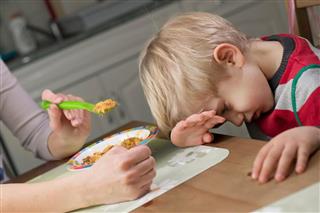
All of us are familiar with the signs of a spoiled child, but what is it about the syndrome? The signs of the syndrome are similar to the characteristics of a spoiled child. Keep reading for details.
A friend of mine is the only child of her parents. Only child – listening the word our mind instinctively conjures up the image of a child who is treated with extra love and care, and she was no different. As a child she was excessively pampered, was given whatever she wanted and was never scolded. She lived life like a princess with maids running around her to help her through little things. Green with envy? But wait there is a twist. She was brought up like this, and problems surfaced when she joined the school. She couldn’t take the scolding by teachers and would cry at the slightest reprimand. She was also unable to do any work when we had gone for a tour and had a hard time doing routine tasks.
Her parents took no effort to change her behavior and always tried to protect her from the cruelty of the world. She was spoiled to the hilt, splurged money, and would get upset and cry at a minor provocation. Also she would get angry when someone didn’t listen to her or did things in an opposite way. This behavior of hers continued even she was a grown up. The conclusion: She had got the spoiled child syndrome, the details of which are explained further.
Spoiled Child Syndrome: Explained
Many parents make the mistake of raising their kids in a wrong way; that is through satisfying all their unrealistic material needs and demands, not scolding them, and treating them like a delicate being. They feel this is the way to convey their love for their kid. The child soon turns a brat, the one who cannot tolerate a no to his demands and successfully gets what he wants, by hook or crook. This attitude is imbibed in his mind and he expects even the world to treat the way he is treated at home. Trouble surfaces when he cannot deal with the harsh realities of life. Handling a spoiled child can be really difficult and demands patience on part of parents.
The term “spoiled child syndrome” was coined by Bruce McIntosh in the year 1989. The syndrome is also known by other names like spoiled brat syndrome and pampered child syndrome. The syndrome is seen in children and failure to control it can result in the child showing it in adulthood. The following are the characteristics of the syndrome.
- The person displays immature and childish behavior, he is only focused on his self and lacks consideration for others.
- The person will also throw tantrums on small issues and also resorts to manipulative and controlling behavior.
- In extreme cases, the person can also get into physical aggressiveness and a violent behavior to fulfill his demands.
Causes for the Syndrome
In most cases it is the attitude of parents that makes the child spoiled for life. Excessive pampering, gifting and fulfilling all his material demands makes a child used to such pampering and so cannot tolerate a no answer to his demands. Parents who themselves miss on the correct attitude do not provide a good role model for their kids and this makes the child develop a spoiled attitude.
Also, differential diagnosis suggests that the chief symptoms of the syndrome are seen in children who suffer from mental health ailments, speech or hearing disorder, and the attention deficit disorder. The symptoms of the syndrome are also sometimes exhibited in children who have been through stress and have been witness to painful events. Kids of parents who have mental illness may show the signs of the syndrome due to exposure to the temperamental behavior of their parents.
Some studies have pointed it out that ‘only child’ of parents, the one who is excessively coddled by all at the home and also has no rivalry in the form of siblings tends to develop the syndrome. But there are plenty of other factors that influence the syndrome and any child can show it. The syndrome may last in the later life of the child too. It affects the behavior of the person and often people with the syndrome find it difficult to cope with the harshness of life.
They cannot deal with tough situations and thus face problems in decision-making, professionalism, balancing personal relations and also cannot handle anger issues. As an adult the child may also show narcissistic attitude. To deal with the syndrome you should learn to be considerate and should understand that if you are special it doesn’t mean others are not special and unique. Counseling and setting parental limits can help counter the spoiled child syndrome.









